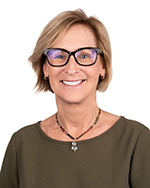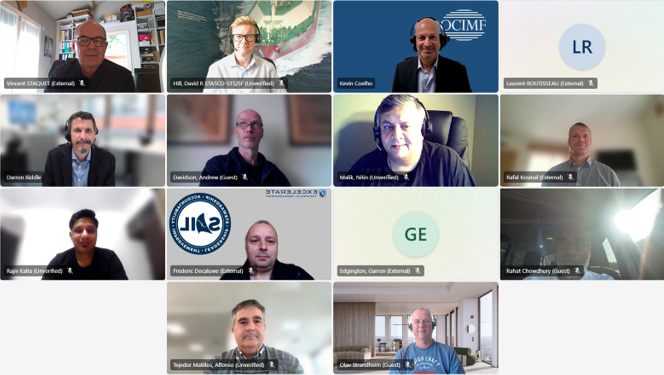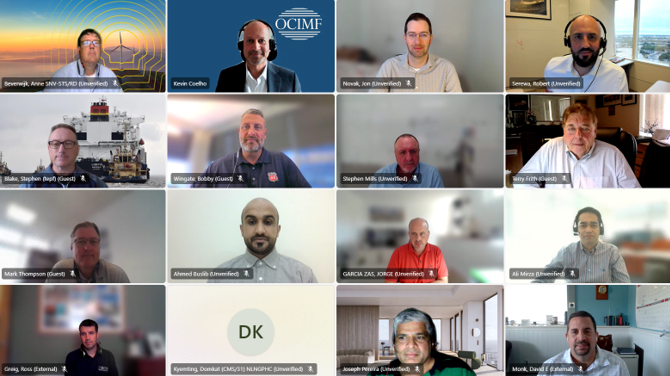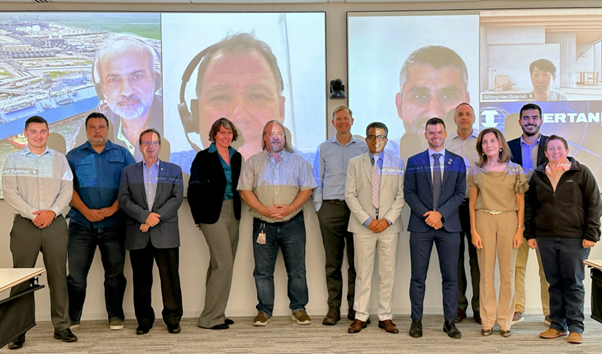“Now that SIRE 2.0 is live, it is crucial for the SIRE programme to produce consistently high-quality reports to continue raising safety standards."
Director's Log

September has been an extremely busy month, with principal committees and expert groups meeting to check on progress and plan for 2025.
And, of course, the month began with the launch of SIRE 2.0. Now that SIRE 2.0 is live, it is crucial for the SIRE programme to produce consistently high-quality reports to continue raising safety standards. The secretariat, OCIMF members, and many others in the industry have carefully established the building blocks of a robust inspection system. Every stakeholder within the SIRE programme plays a role in ensuring the quality of the reports it generates.
OCIMF has focused on supporting SIRE inspectors to ensure they are properly trained and equipped to conduct the new inspections introduced with SIRE 2.0. Additionally, OCIMF is working with other stakeholders in the SIRE programme to help them fully understand their roles and responsibilities.
OCIMF is undertaking several pieces of work to improve the consistency and quality of inspection reports, including the increased use of data analysis to evaluate the programme’s performance and pinpoint areas for improvement.
Inspection report quality is crucial to OCIMF and all report users, as it forms the foundation of trust in the programme. Achieving high-quality reports depends on the support of all stakeholders in the SIRE programme.
It is essential that all stakeholders follow the provided guidance, act with integrity, and report any concerns.

Karen Davis
Director OCIMF
New Publications and Advocacy Director commences role
Darron L. Biddle joined OCIMF this summer on a three-year secondment from ExxonMobil. In September, Darron formally took over from Saurabh Sachdeva as P&A Director.
Darron is an experienced mariner, who has developed and implemented operational, technical, and commercial solutions for onshore and offshore operations in the oil and gas industry for 30 years. He sailed onboard tankers as a deck officer in incremental ranks for eleven years before moving ashore in 2005. Shoreside, he has worked as a marine adviser and supervisor in both upstream and downstream ExxonMobil companies and divisions. From 2016 to 2020 he was seconded to RasGas and Qatargas joint ventures, supporting technical and operational oversight of chartered LNG carriers. More recently, Darron has served in senior adviser roles in marine commercial and operations functions based at ExxonMobil’s Houston Campus.
OCIMF celebrates World Maritime Day
OCIMF was invited to celebrate the World Maritime day at the IMO, with the theme ‘Navigating the Future – Safety First!’


Left: Darron Biddle (OCIMF), IMO Secretary General Arsenio Domiguez, Saurabh Sachdeva (OCIMF) and Don Davis (OCIMF). Right: Arsenio Dominguez and Karen Davis (OCIMF).
Representing OCIMF were Managing Director Karen Davis, outgoing and incoming P&A Directors Saurabh Sachdeva and Darron Biddle, Chair of P&A Offshore Committee Don Davis and Programmes Committee member Laura Roth.
IMO Secretary General Mr Arsenio Dominguez highlighted the need to work together to solve the emerging challenges with the environment and to progress the GHG strategy, with safety at its core, and announced next year’s theme ‘Our Ocean – Our Obligation – Our Opportunity’.
OCIMF's Principal Committees meet to discuss priorities
Programmes Committee
9th meeting: 24–25 September 2024 (London)
Chair: Javed Bhombal (ExxonMobil)
Vice-Chairs: Andrew Rayapan (BP) and Deb Cobb (Marathon)
Secretary: Aaron Cooper (OCIMF Programmes Director)
The bi-annual Programmes Committee meeting was held in person in London on 24–25 September. Topics discussed included a SIRE 2.0 post-launch update as well as updates from each Programmes Expert Group (Innovation and Technology, Programmes Governance, and Inspections Processes) to discuss ongoing work items, priorities and present status. This was also an opportunity to discuss initiatives including submitter governance, management self-assessment strategy, strategising the management of change and knowledge transfer process from the SIRE 2.0 steering/work groups into the existing OCIMF committee structure, as well as updates on training and accreditation, including inspector footprint and coverage, 2025 training plan strategy and updates to training and accreditation guidelines.
The Committee heard updates from INTERTANKO, including feedback on SIRE 2.0. There was also an update recapping 2024 activities and future initiatives within Programmes IT development and support by OCIMF Senior IT Manager and OCIMF’s IT service provider, Nine Software.
For any queries, contact Aaron Cooper, OCIMF Programmes Director, Diese E-Mail-Adresse ist vor Spambots geschützt! Zur Anzeige muss JavaScript eingeschaltet sein!.
Publications and Advocacy Tankers, Barges and Terminal Interfaces Committee
9th meeting: 25–26 September (London)
Chair: Aled Roberts (BP)
Vice-Chairs: Raj Shetty (ENOC), Paul Tait (Chevron)
Secretary: Saurabh Sachdeva (OCIMF P&A Director)
The P&A Tankers, Barges and Terminal interfaces (TBT) Committee met in London for its 9th meeting to discuss and oversee work across the six TBT expert groups. The agenda also included a joint session with the other principal committees, P&A Offshore and Programmes.
The meeting noted good progress on the inland barging strategy in North America and South and Central America and in Europe. On publications, the meeting recognised the ongoing work to update the Ship to Ship Transfer Guide and approved plans for revisions and new publications work to begin in 2025. Work to support the IMO Greenhouse Gas strategy was discussed, along with updates from the Environment, Human Factors and Security functional committees. The meeting also identified the need to review the Management and Self Assessment (MSA) protocols with a view towards a common MSA platform and alignment with SIRE 2.0.
The outgoing secretary, P&A Director Saurabh Sachdeva, thanked the committee for its support as he handed over to the new P&A Director, Darron Biddle. The committee thanked Saurabh for his service to OCIMF over the last 3.5 years. The committee also noted that current Vice-Chair Raj Shetty will take over from current Chair Aled Roberts on completion of the next P&A TBT Committee meeting.
For any queries, contact Darron Biddle, P&A Director, Diese E-Mail-Adresse ist vor Spambots geschützt! Zur Anzeige muss JavaScript eingeschaltet sein!.
Publications and Advocacy Offshore Committee
9th meeting: 23–24 September (London)
Chair: Don Davis (Chevron)
Vice-Chairs: Matthieu Bougeant (TotalEnergies), Alex Morton (Harbour Energy)
Secretary: Saurabh Sachdeva (OCIMF P&A Director)
The Offshore Committee met in London for its 9th meeting to discuss and oversee work across the two offshore expert groups, as well as holding joint sessions with the P&A TBT and Programmes committees.
The meeting reviewed and updated the multiyear plan for Offshore, discussed progress on advocacy and stakeholder engagement, and noted progress on publications. The meeting agreed to support a review of the Offshore Vessel Management Self Assessment in alignment with the Programmes team and noted progress towards implementation of Offshore Vessel Inspection Questionnaire 4 (OVIQ 4).
Presentations were given by the International Association of Oil and Gas Producers (IOGP) and the International Marine Contractors Association (IMCA) on the collaborative work underway between OCIMF and the respective organisations.
Outgoing secretary Saurabh Sachdeva thanked the committee for its support as he handed over secretarial responsibilities to the new P&A Director, Darron Biddle. The committee thanked Saurabh for his service, as well as thanking the outgoing Offshore Adviser Graham Coles for his outstanding support in service of the committee’s work. It was noted that a new Offshore Adviser would be starting in November.
For any queries, contact Darron Biddle, P&A Director, Diese E-Mail-Adresse ist vor Spambots geschützt! Zur Anzeige muss JavaScript eingeschaltet sein!.
New Offshore Adviser joins OCIMF
OCIMF is pleased to announce that Christopher Holland will be joining as Offshore Adviser in November. 
Christopher is on a three-year secondment from Chevron. He is an experienced marine engineer who for 28 years has executed the design, fabrication, operational planning, and life extension of offshore facilities hull and marine systems.
OCIMF welcomes Christopher and wishes him every success in his new role.
INTERTANKO Nautical Sub Committee

As part of the joint work between the two organisations, OCIMF’s Nautical Adviser Kevin Coelho attended INTERTANKO's Nautical Sub Committee held at the European Maritime Safety Agency (EMSA) headquarters in Lisbon, Portugal on 17 September.
Kevin presented an update on OCIMF’s key activities and publications in progress. Discussions took place on the following topics:
- Onshore power supply.
- Engine Power Limitation (EPL) and Shaft Power Limitation (SHaPoli).
- Fujairah Anchorage Re-Orginisation
- E-Navigation – The S-100 standard.
- Marine Autonomous Surface Shipping (MASS).
- Ranging Mode (R-Mode) as a regional effort to combat GNSS spoofing/jamming.
- Weather routeing systems.
- Security update – Red Sea and Persian Gulf.
EMSA opened up their Situation Control Room and presented an overview of the facility and the operations that are under EMSA’s remit.
For further information, contact Kevin Coelho, OCIMF Nautical Adviser, Diese E-Mail-Adresse ist vor Spambots geschützt! Zur Anzeige muss JavaScript eingeschaltet sein!.
Environment news
Environmental Adviser attends EU Emission Trading System sub-group
The EU Monitoring, Reporting and Verification (MRV) Maritime Regulation/Emission Trading System (ETS) sub-group was set up to advise on aligning the data reporting requirements for the EU ETS and the Fuel EU Maritime (FEUM), and is currently focused on turning the existing Q&A into guidance notes before the FEUM comes into force from January 2025.
OCIMF's Environmental Adviser Martin Young attended the meeting on 11 September, which discussed the recent short public consultation on the inclusion of offshore vessels and zero-rated fuels in the annexes to the MRV Maritime Regulation. The link to the short consultation was shared with OCIMF's Offshore Committee, which raised concerns that the current definitions focused on offshore oil and gas while appearing to exclude renewables. This point was raised at the meeting, where the European Commission noted it had used an existing statutory list but would reflect on revising this.
The European Commission also set out its plans to revise the guidance notes. In the next iteration, it wants to include better definitions for offshore and ports. It will also look at the treatment of captured Volatile Organic Compounds (VOC) being used as fuel and LNG Heels.
OCIMF will be joining the next MRV/ETS meeting on 3 October.

Environment Committee
9th meeting: 18–19 September 2024 (London)
Chair: Maria Polakis (BP)
Secretary: Martin Young (OCIMF Environmental Adviser)
The 9th meeting of the Environment Committee was held at OCIMF’s London offices. This was the first meeting for the committee’s new chair, Maria Polakis (BP) and also welcomed three new members, Anurag Wadhwa (ExxonMobil), Jed Belgaroui (Equinor) and Samar Pradhan (Shell). The group also thanked and said goodbye to its former chair Maartje Wibrew-Forster (ex-Shell) and former secretary Filipe Santana.
The meeting welcomed two external presentations: Risto Karinata (ex-Neste committee member) spoke on the Fuel EU Maritime and Daniel Barcarolo of the Maersk Mc-Kinney Møller Center presented on its advocacy activities at the IMO and EU. Both presentations prompted lively discussions.
For any queries, contact Martin Young, OCIMF Environmental Adviser, Diese E-Mail-Adresse ist vor Spambots geschützt! Zur Anzeige muss JavaScript eingeschaltet sein!.
Expert group and working groups reports
Inspection Processes Expert Group
11th meeting: 11 September 2024 (virtual)
Lead: Fred Adolfsen (Equinor ASA)
Co-Lead: Pierre Gobetti (TotalEnergies), Lanny Mason (Marathon Petroleum)
Secretary: Fahmi Tarmizi (OCIMF Programmes Technical Manager)
The Inspection Processes Expert Group’s third meeting of the year was held online and was well attended by 19 members. The secretary provided updates on the progress of open action items. Additionally, the working groups for the Barge Inspection Questionnaire (BIQ) and the Barge Particulars Questionnaire (BPQ) shared updates on the ongoing review process.
Next meeting: January 2025 (TBC)
For any queries, contact Fahmi Tarmizi, OCIMF Programmes Technical Manager, Diese E-Mail-Adresse ist vor Spambots geschützt! Zur Anzeige muss JavaScript eingeschaltet sein!.
Programmes Governance Expert Group
11th meeting: 5 September 2024 (virtual)
Lead: Oscar Rodriguez (CEPSA)
Co-Leads: Vedran Engelbreht (Shell), Aleksandrs Karamisevs (Unipec)
Secretary: Sach Sharma (OCIMF Quality Assurance Manager)
The Programmes Governance Expert Group's (PGEG) third meeting of the year was held online and was attended by nine PGEG members. The group discussed issues related to governance of the inspection programmes as well as training and accreditation matters.
The secretary presented the Submitter Strategy Working Group’s recommendations to address concerns regarding report quality and integrity of programmes. Comments and suggestions provided by the members were also discussed by the group.
The Training & Accreditation Manager provided an update on SIRE, BIRE and OVID new inspector training and the refresher course schedule for 2025. The programme for the SIRE 2.0 CAT-1 pilot course to be held in London on 14–18 October 2024 was presented to the group. PGEG discussed the CAT-1 inspector accreditation process and made some recommendations for consideration by the Programmes Committee. PGEG reviewed and approved the audited inspection process for CAT-1 inspectors.
Next meeting: February 2025 (TBC)
For any queries, contact Sach Sharma, OCIMF Quality Assurance Manager, Diese E-Mail-Adresse ist vor Spambots geschützt! Zur Anzeige muss JavaScript eingeschaltet sein!.
Nautical Expert Group
10th meeting: 20 September 2024 (virtual)
Lead: Nitin Malik (Chevron)
Co-lead: Nitin Chaudhary (BP)
Secretary: Kevin Coelho (Nautical Adviser)
The Nautical Expert Group (NEG) met virtually for its tenth meeting. The group welcomed new members Dave Hill (Shell), Alfonso Malilos (Cepsa) and Rajiv Kalra (Ampol). Incoming Publications and Advocacy Director Darron Biddle also introduced himself. The NEG went on to discuss various agenda items, including the following:
- The lead briefed the meeting on work completed and pending for 2024.
- The secretary briefed on discussions about escort towage with the International Marine Purchasing Association (IMPA).
- INTERTANKO’s Nautical Manager Rafal Kosmal provided an update on their nautical activities and current work. High level discussions took place on navigational safety, anchoring and mooring management.
- OCIMF’s Programmes Technical Manager Fahmi Tarmizi shared insights gained from the initial SIRE 2.0 inspections and gave an update on the successful roll out of the programme on 2 September.
- OCIMF’s Risk and Regulatory Affairs Adviser Abhijit Aul briefed on the nautical regulatory updates from the IMO.
- The secretary provided an update on the enclosed space entry fatality workshops, leading to a good discussion.
Next meeting: January/February 2025 (TBC)
For enquiries, contact Kevin Coelho, OCIMF Nautical Adviser, Diese E-Mail-Adresse ist vor Spambots geschützt! Zur Anzeige muss JavaScript eingeschaltet sein!.
Ship to Shore Interfaces Expert Group
10th meeting: 10 September 2024 (virtual)
Lead: Anne Beverwijk (Shell)
Co-leads: Stephen Blake (ALNG) and Walter Garibotto (YPF)
Secretary: Kevin Coelho (Nautical Adviser)
The Ship Shore Interfaces Expert Group (SSEG) met virtually for its tenth meeting to discuss various agenda items, including the following:
- Stephen Blake shared a safety moment on contingency planning, generating a lot of interest and discussion.
- Guest speaker Jeff Bayham (ExxonMobil) discussed topics raised on the Community of Practice and shared relevant work underway at the World Association for Waterborne Transport Infrastructure (PIANC).
- Terry Frith presented on the Chemical Distribution Institute’s Terminal Inspection Reports on Management and Technical Questionnaires, 8th edition to be released this year.
- The group heard updates from the Secretariat on environmental topics at the IMO and OCIMF Programmes.
- Update on two documents:
- Marine Terminal Management and Self Assessment (MTMSA) is currently under review, which is likely to result in a recommendation to revise.
- The information paper Manning at Conventional Marine Terminals is currently being revised.
- Stephen Blake briefed the group on terminal requirements regarding compatibility and mooring.
Next meeting: February 2025 (TBC)
For enquiries, contact Kevin Coelho, OCIMF Nautical Adviser, Diese E-Mail-Adresse ist vor Spambots geschützt! Zur Anzeige muss JavaScript eingeschaltet sein!.
Emissions Capture and Control Working Group
Chair: Vineet Plaha (Chevron)
Vice-chair: Eric Harrier (ConocoPhillips)
Secretary: Filipe Santana (OCIMF)
The Emissions Capture and Control (ECC) Working Group met in person from 3–5 September 2024 in Houston. During the meeting, the group made significant progress toward finalising the interim paper on ECC systems' safety and operational guidelines. To ensure the completion of the paper, the group also held two virtual meetings on 10 and 16 September.
The interim paper will address the following key topics:
- Considerations for explosive atmospheres.
- Design and compatibility of the ECC collector, boom, and ductwork.
- Safe positioning of the ECC collector relative to the tanker's stacks or funnel.
- Barge manoeuvring and station-keeping, including emergency scenarios.
- Emergency procedures for tanker departure.
- Potential impacts of ECC technology on tanker machinery.
- Risks associated with hazardous substances on the ECC barge.
- ECC Safety Management.
- Competency and training requirements for ECC personnel.
- Manning requirements.
- Human factors influencing ECC operations.
- Process safety-critical equipment.
- Redundancy and secondary means of ECC operations.
- Verification of barge design and construction.
- Communication protocols.
The working group is focused on developing clear, actionable guidelines to enhance the safety and efficiency of ECC operations.
For enquiries, contact Filipe Santana, OCIMF Engineering Adviser, at Diese E-Mail-Adresse ist vor Spambots geschützt! Zur Anzeige muss JavaScript eingeschaltet sein!.
IMO and regulatory news
Intersessional Working Group on Maritime Autonomous Surface Ships (MSC-ISWG-MASS)
The 3rd meeting of the MSC-ISWG-MASS was held at the IMO from 9–13 September 2024 with the following developments taking place:
- Emphasis on finalising Chapter 17 on Safety of Navigation paid off, with functional requirements (FRs) and expected performance (EP) criteria agreed for voyage planning, situational awareness, collision and grounding avoidance, and route execution and monitoring.
- Chapter 20 on Fire protection, detection and extinction was finalised. Key developments included agreement on EP criteria on fire detection for all spaces and for the MASS to remain under navigation control during a fire event. Fire in a Remote Operations Centre would be subject to local regulations for fire response and preparedness.
- Further development of Chapter 23 on Search and Rescue (SAR). It was acknowledged that further consideration is needed to address that SAR is subject to and should comply with not only various IMO instruments and regulations, including SOLAS regulation V/33, but other international treaties as well.
A number of areas of concern are to be addressed through various chapters of the draft MASS Code. Discussion of this is expected to resume via a working group during the 109th session of the Maritime Safety Committee (MSC 109) in December 2024.
10th session of the IMO Subcommittee on Carriage of Cargoes and Containers (CCC 10)
CCC 10 was held at the IMO from 16–20 September. The following discussions and agreements took place:
Safety of personnel entering enclosed spaces onboard ships
- Finalisation of revised draft resolution on Recommendations for entering enclosed spaces aboard ships (A.1050(27)) – This includes enhancements to safety management section before entry as well as updated guidance on the key components of an enclosed space register. Revised guidance is subject to approval by the 110th Maritime Safety Committee (MSC) in 2025.
Safety of ships using alternative and low flashpoint fuel
- Completion of the interim guidelines for ships using ammonia as fuel – Salient points include:
- Concept of ‘toxic areas’ and ‘toxic spaces’ defined.
- Containment solutions other than refrigerated stage at atmospheric pressure to require special consideration by Administrations.
- Concept of a ‘safe haven’ established as a temporary safe shelter for personnel in case of ammonia leak.
- Development of a future work plan which includes:
- Finalisation, approval and subsequent publication of hydrogen as fuel guidelines by 2026.
- Consider, with a view to finalising, the existing guidance for use of methanol/ethanol as a mandatory IMO instrument by 2027.
- Review of the ammonia as fuel guidelines from 2027.
Matters related to the IGC Code and gas ships
- Comprehensive review of the IGC Code concluded with the following key amendments:
- Reworked Chapter 15 on filling limits which includes a 98% maximum filling limit on type C tanks or any tank with a design pressure exceeding 0.7 bar.
- Amendment carriage requirements for carbon dioxide, include assigning ‘toxic’ rating.
- Development of guidance for the use of ammonia as fuel on gas ships to take place intersessionally.
- Introduction of ethane and LPG (propane, butane or mix) cargoes as fuel.
- Proposed revision to interim recommendations for carriage of liquefied hydrogen in bulk – further consideration needed on proposals to include a wider variety of containment system such as the membrane-type, discussion to continue during CCC 11 in 2025.
A summary report for CCC 10 will be issued to OCIMF members in due course.
For enquiries regarding IMO matters, contact Abhijit Aul, Risk and Regulatory Affairs Adviser, Diese E-Mail-Adresse ist vor Spambots geschützt! Zur Anzeige muss JavaScript eingeschaltet sein!.








